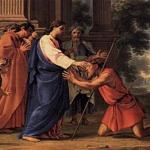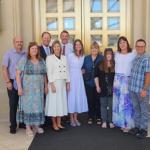
Breaking the Law
Most everyone has witnessed someone driving through a red light, exceeding the posted speed limit, or not stopping at a stop sign. Despite street signs and law enforcement officer’s efforts, people break the law every day.
We, too, much like drivers who break the law, are often found in transgression against the laws of God. Be them sins of omission or sins of commission, “all have sinned, and come short of the glory of God” (Romans 3:23).
Stories of these sins can be found in the scriptures. This last week, I read the story of David’s sins: murdering Uriah and committing adultery with Bathsheba. I was especially impacted by God’s response in 2 Samuel 11–12.
David was a man who failed to yield to divine stoplights. When the prophet Nathan came to tell David of his sins, David acknowledged that his sin was not only against those he had harmed, but also against the Lord (2 Samuel 12:13). David deserved the consequence of death (see verse 5).
Perhaps David was relieved when Nathan responded, “The Lord also hath put away thy sin; thou shalt not die.” (verse 13). But that relief probably didn’t last too long—there would still be a consequence for David’s sins. Nathan continued, “By this deed . . . the child also that is born unto thee shall surely die” (verse 14). Because of the ‘red lights’ that David ran, he would endure a heartbreaking consequence.
The act of running a red light does not have such severe consequences as David faced. But the analogy still applies. Although we might pay for our ticket, other consequences might come. Our automobile insurance rates might rise—or, for youth, parents might restrict driving privileges. These are natural consequences for negligent driving.
Finding Forgiveness
The Lord allows consequences, even when they come after the sin is forgiven. He does this, in His abundant love and mercy, to strengthen the sinner and fortify him or her against future transgression. Consequences act as a guardrail as we continue to navigate the roads of mortality.
Interestingly, while the Lord “cannot look upon sin with the least degree of allowance” (Doctrine and Covenants in 1:31), the Lord has also declared that “as often as my people repent will I forgive them their trespasses” (Mosiah 26:30). In fact, the scriptures are replete with promises of forgiveness for sin:
- The Lord is longsuffering, and of great mercy, forgiving iniquity and transgression (Num. 14:18)
- The Son of man hath power on earth to forgive sins (Matt. 9:6)
- He that repents and does the commandments of the Lord shall be forgiven (D&C 1:32)
- He who has repented of his sins is forgiven, and I, the Lord, remember them no more (D&C 58:42)
- I have forgiven thee thy transgression (Moses 6:53)
This mercy does not give us an excuse to sin further, though. Let’s say you are caught running red lights several times and are required to appear before a judge. But then the judge decides to have mercy on you and let you leave the courtroom free of any ramifications. Would you then have permission to run every red light on your way home from the courtroom, just because the judge had extended mercy?
Absolutely not. Teaching this principle, Paul, in writing the book of Romans, wrote, “What shall we say then? Shall we continue in sin, that grace may abound? God forbid” (Romans 6:1–2).
Repenting of Sin
Yes, the Lord will forgive “as often as [we] repent” (Mosiah 26:30), but what does it mean to be truly repentant? In other words, how can you tell if you have truly repented?
The answer, ironically, is found in what happens before the repentance process begins. In his book The Miracle of Forgiveness, President Kimball teaches: “The truly repentant man is sorry before he is apprehended. He is sorry even if his secret is never known. He desires to make voluntary amends. Repentance of the godly type means that one comes to recognize the sin and voluntarily and without pressure from outside sources begins his transformation.”
The keys to gaining mercy for sin are recognizing we have broken a law, feeling godly sorrow for our transgression, and then seeking the Lord’s forgiveness. President Dieter F. Uchtdorf taught, “The heavens will not be filled with those who never made mistakes but with those who recognized that they were off course and who corrected their ways to get back in the light of gospel truth.”
This week, take a few minutes to examine your life. Look for areas of possible weakness and even transgressions. Seek the Lord in prayer, or set up an appointment with your bishop. Confess your sin, ask the Lord for forgiveness, and make the necessary corrections to your life. Invite Him to help you feel the weight of your choices—and to start to experience the weightlessness of forgiveness.
When you run red lights during mortality, the Lord is not surprised or angry. He simply pleads for you to return to Him in righteousness, to connect with Him, and to enjoy the blessings that come from true repentance and change.
Be sure to watch out for the traffic lights in your life. Seek to obey the laws of the land—and the laws of God.














